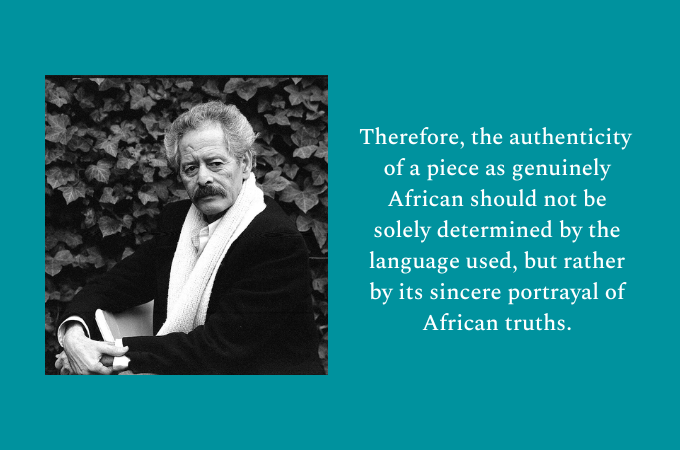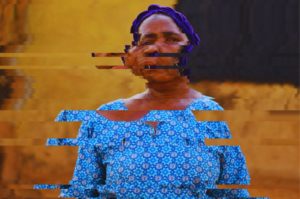
On November 15th, 2003, Morocco lost one of its most notable and thought-provoking writers, Mohammed Choukri. His legacy and literary contributions have since provided comfort to Moroccan writers, who have struggled to match the depth, impact, and unwavering honesty that Choukri imbued into his works. Even now, Choukri’s influence remains a powerful literary force that extends beyond Morocco and across the African continent.
The Life that is Mohammed Choukri
Choukri’s early years were filled with immense challenges, starting with the devastating famine in the Rif region of Morocco and the turbulent era of Spanish colonial forces. However, instead of succumbing to these adversities, Choukri’s resilience and his deep desire to share his hardships drove him towards a path of independent learning and personal growth. To escape the famine, he had to leave his hometown of Beni Chiker and relocate to Tangiers during the 1940s. It was there that he embarked on his educational journey at the age of twenty, focusing on acquiring the fundamental skills of reading and writing.
In Tangiers, Choukri faced the daunting task of adapting to a new environment, which compelled him to dedicate himself to mastering the Moroccan dialect in order to effectively communicate and secure employment opportunities. Unfortunately, his efforts were met with ridicule and he was derogatorily labelled as the “Child of Famine” due to his Riffian origins. This lived experience of linguistic and cultural trauma had a profound impact on Choukri’s life and his pursuit of literature. These traumatic experiences fuelled his determination not only to achieve proficiency in Classical Arabic, but also to utilize it as a powerful tool for self-expression. Through his literary works, Choukri aimed to articulate the injustices he had endured and channel his inner turmoil into artistic expression, leaving an indelible mark on the narrative of his life.
The Controversy that is Mohamed Choukri: For Bread Alone (1972)
Writing serves as a potent instrument for liberation and self-expression, a truth that numerous literary works exemplify, particularly in the realm of post-colonial African literature. Choukri, being a courageous and controversial writer, fearlessly embodied this notion of writing. His autobiographical novel, For Bread Alone, which chronicles his arduous escape and migration from the famine-stricken Rif region in Northern Morocco to Tangiers in search of survival and a better life, faced censorship and criticism. Despite Choukri’s extensive bibliography since acquiring the skill of writing, he, like many African writers, is predominantly remembered for his inaugural work: For Bread Alone.
In his auto-biographical novel, Choukri fearlessly exposes the social, economic, and moral challenges he encountered in Morocco during and after the colonization by Spanish and French forces. His work portrays the suffering and struggle of an entire nation, culture, and identity, enduring both natural disasters and institutional oppression. Consequently, his novel faced a ban on its original Arabic publication until 1982, while an English translation by Paul Bowles was released way back in 1973. Choukri’s authentic voice and original vision in For Bread Alone were inaccessible to Moroccan readers for almost ten years, and even today, despite its publication, his novel is disliked by those who claim to be experts, academics, and educators of literature.
It is disheartening to witness that many high school teachers and university professors in Morocco discourage their students from exploring Choukri’s writings, without any solid academic grounds. As a teenager, when I attempted to read Choukri’s work for the first time in my hometown, the same place Choukri left as a young boy, I had to conceal the book from everyone around me. My high school Arabic teacher was aware of this and tried to dissuade me, echoing the opinions of other critics who stated Choukri’s writing lacked linguistic elegance and should be avoided. “Choukri is nothing more than a street dog,” she asserted, “he is not a true writer, his texts lack literary value, and you should distance yourself from him.” This unfortunate reality highlights how even the birthplace of Choukri, the very setting he consistently depicted in his works, rejects his novel and the invaluable contribution he offers to the collective memory of his people.
Choukri’s book faces opposition not only from institutional and educational systems, but also from his own family and friends. Malika Choukri, his sister, disapproves of the book’s sexual stories and portrayal of their family’s violent connection with their father. Meanwhile, Abdallah El Wahabi, a close friend and owner of a coffee shop Choukri frequented, notes that all of Choukri’s friends in Tangiers’ inner market lane have criticized the autobiographical novel for its obscenity and aggressiveness in both form and content. Despite the opposition, Choukri’s bold portrayal of life in Morocco during colonial and postcolonial times remains an essential pillar to both Moroccan and African literature.
For Bread Alone and The Creative Process
For Bread Alone breaks free from anything that hinders the creative process. By delving into Choukri’s biography, one can discover fascinating aspects that go beyond explicit sexual narratives or alleged vulgar language. Choukri’s narrative is unique, marked by his struggle to establish himself and persevere in a challenging era, defying expectations associated with his background. Despite his exceptional writing skills, readers often refuse to acknowledge his literary merit, dismissing his work as “unfit” or “too immoral” to be read due to their reluctance to engage with the content on its own merits.
Choukri’s life, as portrayed in For Bread Alone, is not intended to encourage others to follow a path of turmoil, despite what critics may argue. Rather, it serves as a realistic depiction of the harsh realities of Moroccan society during a specific and sensitive period. Choukri was well aware of this, as evidenced by the opening pages of his book, where he explains why he began writing. At that moment, Choukri stresses the importance of writers sharing their own experiences as honestly as possible, stating
Life has imparted upon me the wisdom of patience, urging me to navigate the intricate dance of time while retaining the core of my acquired wisdom. Speak your truth before your final breath, for it will undoubtedly carve its path into the world. Its fate matters not; what holds significance is the spark it kindles—whether an emotion, a sorrow, or a fleeting caprice—that can illuminate even the darkest and most perilous corners. (For Bread Alone, p.8. My translation from Arabic to English)
Choukri’s quandary with his society strongly reminds me of Baldwin’s perspective on the artist’s role in “The Creative Process.” In this brief piece, Baldwin refers to the artist as “the incorrigible disturber of peace.” Choukri, both in life and even after his passing, remains an unwavering disturber, constantly reminding the people of Morocco and Africa as a whole about the prevailing injustices. Moreover, he sheds light on how these injustices persist in post-colonial society, distorting the African identities and perpetuating an unjust state that must be addressed through literature. The ultimate goal is for society to take responsibility and strive for redemption by sharing these narratives.
It is evident in every society that when faced with a bold and honest artist, society tends to reject them and their work. This rejection can be explained by Baldwin’s belief that artists have the responsibility to make their societies see the truth once again, especially after they have become accustomed to the injustices of their society. Baldwin argues that any genuine artistic creation that challenges the status quo will inevitably face resistance and rejection from society. Baldwin’s description of this matter can be read on Choukri’s work and that of other post-colonial African writers. He writes: “Societies never know it, but the war of an artist with his society is a lover’s war, and he does, at his best, what lovers do, which is to reveal the beloved to himself and, with that revelation, to make freedom real.”
The African Writer that is Mohammed Choukri
Choukri’s identity as an African writer often goes unnoticed, despite his unwavering commitment to portraying the realities of Africa and his relentless pursuit of positive change through literary critique. This oversight stems from a common misconception that his work, originally written in Arabic, holds no significance in the broader context of post-colonial African literature. However, what many fail to grasp is that Arabic is not Choukri’s mother tongue; rather, it is Tarrifit. Just like South African or Ghanaian writers who employ English to convey their literary narratives, Choukri chooses Arabic as his medium of expression. The artist’s intent and the value it carries are the true essence of their work, with the language being a malleable tool. Therefore, the authenticity of a piece as genuinely African should not be solely determined by the language used, but rather by its sincere portrayal of African truths.
Choukri’s contributions in post-colonial African literature have had a lasting impact on generations of writers, addressing profound subjects and highlighting the importance of critiquing the African reality and envisioning innovative solutions. Regardless of an author’s stylistic choices or literary preferences, if their work aims to dissect and reconstruct the post-colonial African experience, it inherently embodies the spirit of Africa. Choukri’s use of Arabic, far from diminishing his African identity, showcases the diverse range of expressions within the continent and the heart and substance of his work truly reflect its African essence.
In remembering Choukri on his 20th memorial, I would like to highlight that it is, indeed, unfortunate that many literary analyses and interpretations of Choukri’s life come from various backgrounds, but few truly highlight his significance as a first-generation African writer who contributed massively to the appreciation and uniqueness of post-colonial African literature. I believe that a more thorough examination of Choukri’s work in conjunction with other African literary efforts is necessary. This exploration could lead to a much-needed shift, breaking the tendency to categorize his contributions solely within an Arabic community. Instead, it would reveal the true nature of Choukri’s work as a post-colonial African writer, characterized by his militancy, honesty, Africanness, and boldness.
Certain authors possess an inherent ability to withstand the test of time and endure. Many of these writers have encountered challenges within their societies. In my opinion, Choukri, although he departed just two decades ago, demonstrated even during his lifetime that he belongs to the category of artists who transcend time. Hence, this homage to his legacy not only reflects on the past, but also opens up for the future possibilities that Choukri’s contributions have opened up for African readers and writers.
Photo by Schiffer-Fuchs/ullstein bild via Getty Images










COMMENTS -
Reader Interactions